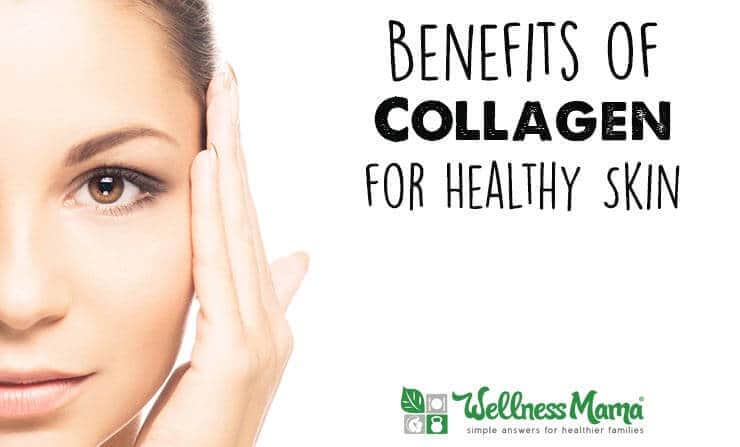Collagen is one of the most abundant proteins in the body and it makes up a large part of our skin, hair and nails. Technically a polypeptide, collagen contains a mixture of amino acids like proline and glycine, which are found in all connective tissue within the body (including vital organs!).
While beauty treatments and shampoos trumpet the benefits of collagen on their labels, the real benefits come internally, not from a topical treatment.
What is Collagen?
Collagen is a long-chain amino acid and the most abundant protein in the body. It is composed of the individual amino acids Glycine, Proline, Hydroxyproline and Arginine and in nature is found exclusively in animal tissue, especially bones and connective tissue.
It is what is responsible for giving skin elasticity, hair its strength, and connective tissue its ability to hold everything in place. In fact, the collagen protein makes up 30% of the total protein in the body, and 70% of the protein in the skin!
The body’s natural collagen production declines with age and many modern lifestyle factors (like stress, poor diet, gut health imbalances, etc.) can also decrease the body’s ability to make it.
Gelatin vs. Collagen
These terms are often used interchangeably, but there is a difference.
Collagen is the basic form of the protein found in the body, and gelatin is produced when collagen is boiled or otherwise heated. The two have very similar compositions and are almost interchangeable, but the difference gets confusing when it comes to supplements. In general:
- Collagen Powder- (the Hydrolyzed form of Gelatin) contains these proteins broken down into individual peptide chains. This form is typically easier to digest and is often suggested for people with digestive problems. One advantage to this particular form of collagen is that it easily mixes into most hot and cold drinks and is tasteless, making it easy to add to foods and drinks for consumption, however, it will not gel and is not good in recipes that require gelatin. In the brand I take, this form has a blue lid)
- Gelatin Powder – I use a grass-fed pastured gelatin powder. Gelatin is the pure form that is often recommended on diets like GAPS and SCD (though some people may not be able to digest it at first and must stick to meat stocks instead), for its ability to coat the digestive tract. From a cooking perspective, it is the form that “gels” and is great for making recipes like chewable vitamins, gummies, and marshmallows. This is the form naturally found in bone broth, as the heat breaks down the natural collagen found in the bones. This is the reason bone broth tends to thicken and gel in the fridge.
In past generations, people often consumed much larger amounts of collagen/gelatin from food, as our grandparents and great-grandparents prepared many meals at home and made things like broths, gravies, and bone-in meats that naturally contained these amino acids.
Benefits of Collagen for Skin
While collagen is beneficial to the entire body, it is most noticeably beneficial to the skin. This is because as a person ages, the epidermic (outer layer of skin) thins and loses elasticity in a process known as elastosis. As this happens, a person tends to show more signs of aging and acquire more wrinkles.
The good news is that these changes do not seem to be permanent or irreversible. In fact, a double-blind placebo study conducted last year found that women who took collagen hydrolysate (the peptide form) regularly for 8 weeks saw a 20% reduction in wrinkles!
Even more exciting:
Additionally, after 8 weeks of intake a statistically significantly higher content of procollagen type I (65%) and elastin (18%) in the BCP-treated volunteers compared to the placebo-treated patients was detected.
This means that supplemental collagen appears to help the body’s own production process improve, as procollagen is the precursor to collagen in the body.
This study also showed that collagen consumption can increase skin elasticity and moisture, which also declines during the aging process.
It is important to note that this study used the hydrolyzed (peptide) form, which is a more easily digestible form of collagen. I’m not aware of any studies that directly compare gelatin and collagen for their ability to improve skin, so for skin health, I use the peptide form.
Other Benefits
Though not as immediately noticeable, there are other benefits that might be even more important. For instance, collagen has been studied for its role in:
- Bone and Joint Health– Collagen may be beneficial to bones and joints in the same way it benefits the skin. By helping the body’s natural production of collagen and providing a bioavailable source of these amino acids, collagen may improve bone and joint health over time. In fact, a double-blind, placebo study showed significant improvement in joint pain.
- Hormone Balance- Emerging research shows that the specific amino acids in collagen may help improve the amino acid balance in the body and support the body’s natural hormone production.
- Digestion– As mentioned, gelatin and collagen may help coat the digestive tract and improve digestion, and the consumption of gelatin is often recommended on gut-specific diets like GAPS and SCD.
Where To Find Collagen
There are several good sources of high-quality gelatin and collagen powders. When sourcing, it is important to make sure that it is obtained from grass-fed and pastured humanely raised sources from a reputable company. I purchase this grass fed gelatin and this collagen powder because I was able to verify that their gelatin and collagen are:
- Sourced from pasture-raised animals
- Packaged in BPA-free containers
I also enjoy these collagen bars from Bulletproof to snack on.
This article was medically reviewed by Dr. Scott Soerries, MD, Family Physician and Medical Director of SteadyMD. As always, this is not personal medical advice and we recommend that you talk with your doctor.
Do you use collagen or gelatin? How do you use it?


Leave a Reply